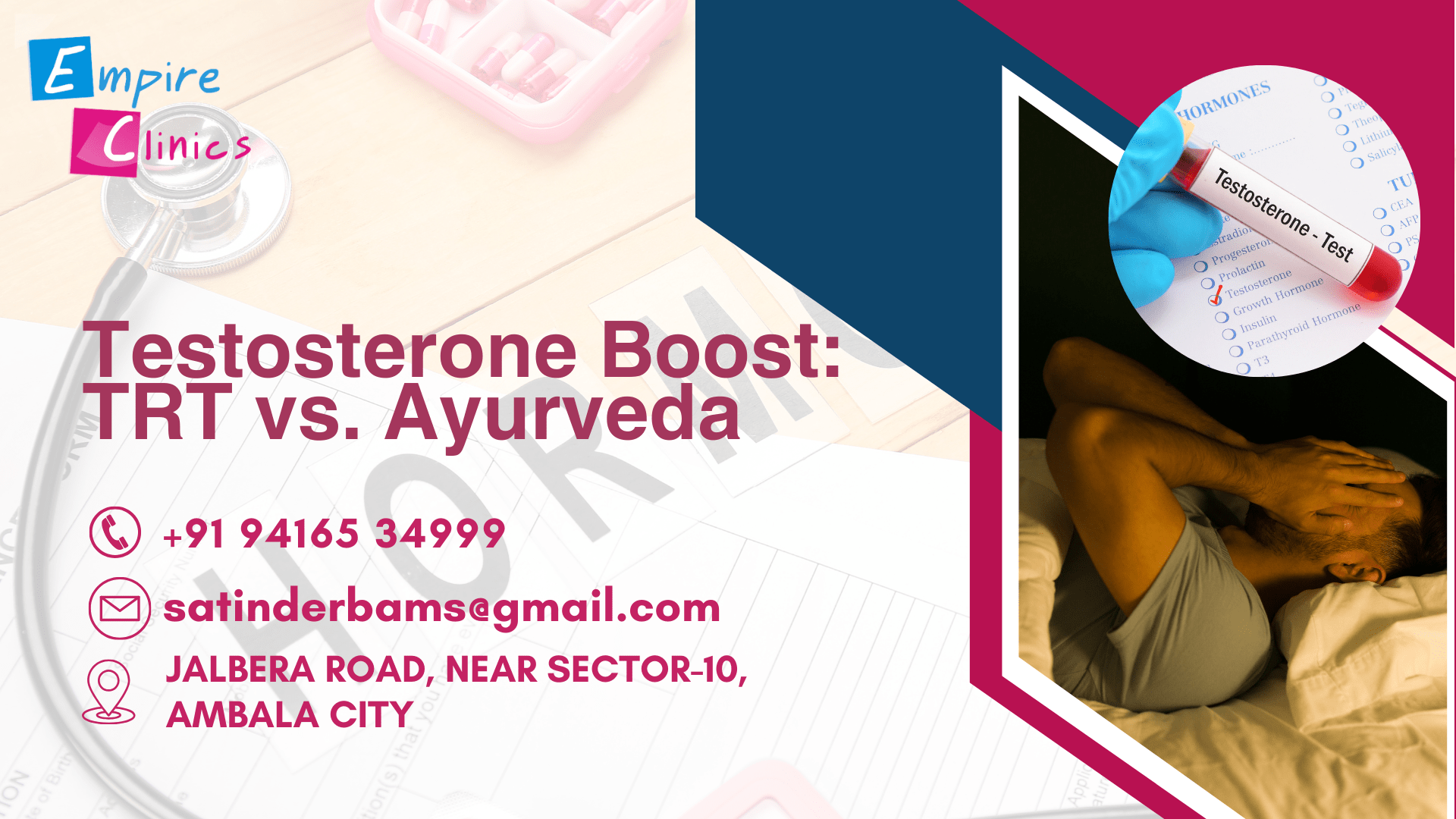Testosterone Replacement Therapy (TRT) and Ayurvedic herbs are two distinct approaches to managing low testosterone levels. Each has its own set of benefits, risks, and considerations. Here’s a detailed comparison of both methods to help you understand their differences and make an informed decision.
Testosterone Replacement Therapy (TRT)
What is TRT?
Testosterone Replacement Therapy (TRT) is a medical treatment designed to address low testosterone levels, also known as hypogonadism. It involves supplementing the body with testosterone through various delivery methods to restore normal levels and alleviate symptoms.
Forms of TRT:
- Injections: Administered directly into the bloodstream, typically every 1-2 weeks.
- Patches: Applied to the skin, releasing testosterone slowly over time.
- Gels: Applied daily to the skin, allowing testosterone to be absorbed through the skin.
- Pellets: Implanted under the skin, releasing testosterone gradually over several months.
- Oral Tablets: Less commonly used due to potential liver toxicity.
Benefits of TRT:
- Effective Symptom Relief: TRT can quickly alleviate symptoms of low testosterone such as fatigue, low libido, and muscle loss.
- Improved Mood and Energy: Many patients report better mood, increased energy levels, and improved quality of life.
- Enhanced Muscle Mass and Strength: TRT can help increase muscle mass and strength, contributing to overall physical health.
Risks and Side Effects:
- Cardiovascular Risks: TRT may increase the risk of heart attack, stroke, and other cardiovascular issues, particularly in older men or those with preexisting conditions.
- Hormonal Imbalances: Long-term use can affect natural testosterone production and may lead to imbalances in other hormones.
- Prostate Health: TRT can potentially exacerbate prostate issues, including benign prostatic hyperplasia (BPH) or prostate cancer.
- Infertility: TRT can reduce sperm production and potentially impact fertility.
Monitoring and Management:
Regular follow-up with a healthcare provider is essential to monitor hormone levels, assess side effects, and adjust the treatment as needed.
Ayurvedic Herbs for Testosterone Boosting
What is Ayurveda?
Ayurveda is a traditional system of medicine from India that focuses on balancing the body's energies (doshas) through natural remedies, diet, and lifestyle changes. Ayurvedic herbs are used to support overall health and address specific conditions, including low testosterone.
Common Ayurvedic Herbs for Testosterone:
- Ashwagandha (Withania somnifera): Known as an adaptogen, ashwagandha helps reduce stress, balance hormones, and improve vitality. It is believed to support healthy testosterone levels and enhance overall reproductive health.
- Tribulus Terrestris: Often used to enhance libido and support hormonal balance, tribulus is thought to increase testosterone levels and improve sexual function.
- Shatavari (Asparagus racemosus): This herb is traditionally used to support reproductive health and balance hormones. It is believed to enhance vitality and support sexual function in both men and women.
- Safed Musli (Chlorophytum borivilianum): Used as a tonic, safed musli is thought to support sexual health, increase stamina, and improve overall energy levels.
Benefits of Ayurvedic Herbs:
- Natural and Holistic: Ayurvedic herbs work to balance the body’s energies and support overall health, offering a more holistic approach to managing low testosterone.
- Fewer Side Effects: Generally, Ayurvedic herbs have fewer side effects compared to synthetic medications. However, quality and efficacy can vary based on the source and preparation.
- Improved Well-being: Herbs like ashwagandha and shatavari may help improve mood, reduce stress, and enhance overall vitality.
Risks and Considerations:
- Variable Efficacy: The effectiveness of Ayurvedic herbs can vary among individuals and may not provide the rapid results seen with TRT.
- Interactions: Ayurvedic herbs can interact with other medications or health conditions, so it’s important to consult with a healthcare provider before starting any herbal regimen.
- Quality Control: The quality and purity of herbal products can vary, making it crucial to source herbs from reputable suppliers.
Combining Approaches:
Some individuals may choose to combine TRT with Ayurvedic herbs to manage their testosterone levels and overall health. This approach should be carefully monitored by a healthcare provider to ensure safety and effectiveness.
Have any Doubt in Testosterone Replacement Therapy, Contact Now
Both Testosterone Replacement Therapy (TRT) and Ayurvedic herbs offer distinct approaches to managing low testosterone levels. TRT provides a direct and often rapid solution for increasing testosterone but comes with potential risks and side effects. Ayurvedic herbs, on the other hand, offer a more holistic approach with potentially fewer side effects but may require a longer time to see results.
Choosing the right approach depends on individual needs, health conditions, and personal preferences. Consulting with a healthcare provider or a qualified practitioner is essential for making an informed decision and ensuring safe and effective treatment.







